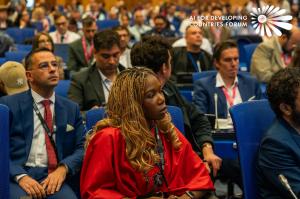Vienna Summit Charts 'Third Path' for AI Development in Global South at UN Headquarters

Delegates from over 120 countries attend the AI for Developing Countries Forum Vienna Summit 2025 at the United Nations Office at Vienna, where 600 participants launched the FAIR framework for cooperative AI development in the Global South.
Three-day AIFOD conference produces FAIR framework for cooperative AI sovereignty, bringing together 600+ delegates from 120+ countries at UN Vienna.
VIENNA, AUSTRIA, July 31, 2025 /EINPresswire.com/ -- Senior officials from developing nations, AI industry leaders, and UN representatives concluded a landmark three-day summit at the United Nations Office at Vienna, producing what organizers call a "third path" for artificial intelligence development that could reshape how emerging economies approach the technology revolution.
The AI for Developing Countries Forum (AIFOD) Vienna Summit 2025, held July 15-17, brought together over 200 delegates from 50+ countries to address a critical question: How can the Global South move from being AI consumers to AI creators without sacrificing sovereignty or cultural values?
The choice of the United Nations Office at Vienna as the venue was deliberate, emphasizing the global implications of AI governance decisions. UN representatives participated throughout the discussions, highlighting how AI development in the Global South connects to broader sustainable development goals.
"This historic venue reminds us that the challenges we face require multilateral solutions," noted Laurent Lacroix, Chief Data Officer at INTERPOL, who presented on neutral facilitation in AI governance. "No single country or organization can solve the AI divide alone."
The conference addressed three fundamental tensions that have constrained developing nations' AI strategies: infrastructure versus applications, local innovation versus technology transfer, and flagship projects versus distributed funding. Rather than choosing sides, delegates explored hybrid approaches that could deliver immediate benefits while building long-term capacity.
Jason Slater, Chief AI and Innovation Digital Officer at UNIDO, emphasized the organization's commitment to industrial development through AI. "We believe that AI and digital technologies can help small and medium enterprises access private sector opportunities," Slater said, highlighting UNIDO's focus on bringing solutions that benefit member states, particularly in developing countries.
The summit's most concrete outcome was the launch of the FAIR (Future AI Investment Responsibility) framework - a comprehensive guide for responsible AI investment that moves beyond purely economic metrics to include community impact and cultural preservation. The framework's four pillars emphasize respectful data and community engagement, sustainable infrastructure development, benefit sharing with local communities, and governance models that balance innovation with ethical considerations.
"The efficacy of AI investment should not be measured only in economic terms, but also for how it can benefit local communities and users," stated the framework's principal architect during the closing presentation.
Brian Poe Llamanzares, Congressman and President of the AI Global Governance Council, addressed the critical question of public-private partnerships in AI infrastructure development. "How can public funds strategically de-risk private investments in AI infrastructure? Can we create financial vehicles that align development values with profitable returns?" Llamanzares asked, setting the stage for extensive discussions on innovative financing mechanisms.
Juraj Hostak, Director of the Department of Innovation at Slovakia's Ministry of Investment, shared his country's experience with AI governance and funding. "AI governance is not just technical, it's also political. You need leadership, trust and coordination," Hostak explained, describing Slovakia's approach to establishing a national AI office and blended funding models.
The discussions revealed significant challenges in traditional approaches to AI development. Several government officials noted that current models often leave developing countries dependent on foreign technology without building domestic capacity or ensuring that AI systems reflect local values and needs.
Richard Malcolm Simbil, Counsel to the Ombudsman Commission of Papua New Guinea, provided insights into the governance challenges facing smaller nations. Speaking about PNG's digital transformation efforts serving 10.6 million people across diverse communities, Simbil emphasized the importance of building trust and ensuring AI systems serve local needs.
A significant portion of the summit focused on open source technologies as an alternative to expensive proprietary systems. Government representatives and industry leaders debated whether open source frameworks could democratize AI access while maintaining security and sovereignty concerns.
The concept of "cooperative sovereignty" emerged as a central theme, with officials arguing that true independence in the AI era comes not from isolation but from strategic collaboration that maintains agency and control. This approach recognizes that smaller nations can achieve greater influence through coordinated efforts than through individual strategies.
Cultural and ethical considerations featured prominently in the discussions. Officials emphasized that AI development must respect traditional knowledge systems and ensure that technological advancement doesn't come at the expense of cultural identity or community values.
The summit concluded with delegates approving the Vienna Consensus document, which establishes principles for future AI development cooperation. The consensus emphasizes that "small countries are a driving force for a fair, respectful, accessible and sustainable use and development of AI" and commits to putting "human beings at the center of our ideas and actions."
In his closing address, AIFOD co-founder Tianze Zhang emphasized the historic nature of the gathering: "The global south is not waiting to be invited into the future - we are already building it." He noted that the summit moved beyond theoretical discussions to focus on practical, implementable solutions addressing real challenges in agriculture, healthcare, education, and governance.
Looking ahead, AIFOD announced plans to establish regional implementation hubs to support the FAIR framework's adoption. These hubs will work with government agencies and international organizations to provide technical assistance and facilitate knowledge sharing.
The Vienna Summit's emphasis on practical cooperation over theoretical debates appears to have resonated with government officials and international representatives. As delegates departed the UN headquarters, many were already planning follow-up collaborations based on the frameworks and connections established during the intensive three-day conference.
The conference's core message - that the Global South can shape rather than simply adapt to the AI revolution through coordinated action - may prove to be its most lasting contribution to the ongoing global conversation about technology's role in development.
Dawid Wiktor
Media Scope Group
email us here
Legal Disclaimer:
EIN Presswire provides this news content "as is" without warranty of any kind. We do not accept any responsibility or liability for the accuracy, content, images, videos, licenses, completeness, legality, or reliability of the information contained in this article. If you have any complaints or copyright issues related to this article, kindly contact the author above.
Tampa Florida based Krewe of Europa to appear in the Tarrytown NY Halloween Parade
Key Housing Announces August Featured Listing for Bakersfield Short-term Housing
Hands-On Diagnostics Announces Annual Symposium to Help Physical Therapists Improve Patient Outcomes
Więcej ważnych informacji
 Jedynka Newserii
Jedynka Newserii

 Jedynka Newserii
Jedynka Newserii

Konsument

Grupa nowych biednych emerytów stale się powiększa. Ich świadczenie jest znacznie poniżej minimalnej emerytury
Przybywa osób, które z powodu zbyt krótkiego czasu opłacania składek pobierają emeryturę niższą od minimalnej. Tak zwanych nowych biednych emerytów jest w Polsce ok. 430 tys., a zdecydowaną większość grupy stanowią kobiety – wskazują badania ekspertów Instytutu Pracy i Spraw Socjalnych. W ich przypadku krótszy okres składkowy zwykle wynika z konieczności opieki nad dziećmi lub innymi osobami w rodzinie. Wśród innych powodów, wymienianych zarówno przez panie, jak i panów, są także praca za granicą lub na czarno oraz zły stan zdrowia.
Media i PR
M. Wawrykiewicz (PO): Postępowanie z art. 7 przeciw Węgrom pokazało iluzoryczność tej sankcji. Unia wywiera naciski poprzez negocjacje nowego budżetu

Przykład Węgier pokazał, że procedura z artykułu 7 traktatu o UE o łamanie praworządności nie ma mocy prawnej z powodu braku większości, nie mówiąc o jednomyślności wśród pozostałych państw członkowskich. Negocjacje nowego budżetu UE to dobry pretekst do zmiany sposobu części finansowania z pominięciem rządu centralnego. Czerwcowy marsz Pride w Budapeszcie pokazał, że część społeczeństwa, głównie stolica, jest przeciwna rządom Viktora Orbána, ale i na prowincji świadomość konsekwencji działań Fideszu staje się coraz większa przed przyszłorocznymi wyborami.
Firma
Blockchain zmienia rynek pracy i edukacji. Poszukiwane są osoby posiadające wiedzę z różnych dziedzin

Zapotrzebowanie na specjalistów od technologii blockchain dynamicznie rośnie – nie tylko w obszarze IT, ale również w administracji, finansach czy logistyce. Coraz więcej uczelni wprowadza programy związane z rozproszonymi rejestrami, które wyposażają studentów w umiejętności odpowiadające wymogom rynku.
Partner serwisu
Szkolenia

Akademia Newserii
Akademia Newserii to projekt, w ramach którego najlepsi polscy dziennikarze biznesowi, giełdowi oraz lifestylowi, a także szkoleniowcy z wieloletnim doświadczeniem dzielą się swoją wiedzą nt. pracy z mediami.



![Nestlé w Polsce podsumowuje wpływ na krajową gospodarkę. Firma wygenerowała 0,6 proc. polskiego PKB [DEPESZA]](https://www.newseria.pl/files/1097841585/fabryka-nesquik_1,w_85,r_png,_small.png)






.gif)

 |
| |
| |
|